Eliza, a Pinay from Antique, was just about to start building a family in Kyiv when Russia invaded Ukraine. Then her husband enlisted in the army. A portrait of a Filipina’s life in war-torn Ukraine.
On the eve of 24 February 2022, Eliza, excitedly placed her passport, residence permit and medical records in her bag. Her application for an appointment at the fertility clinic was finally granted. It would be the first day of her IV fertilization process.
At five in the morning, a series of massive explosions went off, jolting Eliza and Andrii, her Ukrainian husband, out of their sleep. “I felt our building shake. Our window panes were rattled,” describes Eliza in our Zoom interview, adding that she could hear her neighbors rush out of their building. The frantic sounds of ambulance siren and an air raid alert added to the tension outside. Initially, they thought it was an accident in one of the factories nearby.
Two hours later, Eliza and her husband were out in the street heading to the fertility clinic. But instead of the clinic, they went straight to the supermarket to buy water and food supplies. That morning, Kyiv was a sight straight out of a war film. It was under siege. The Russians had invaded Ukraine.
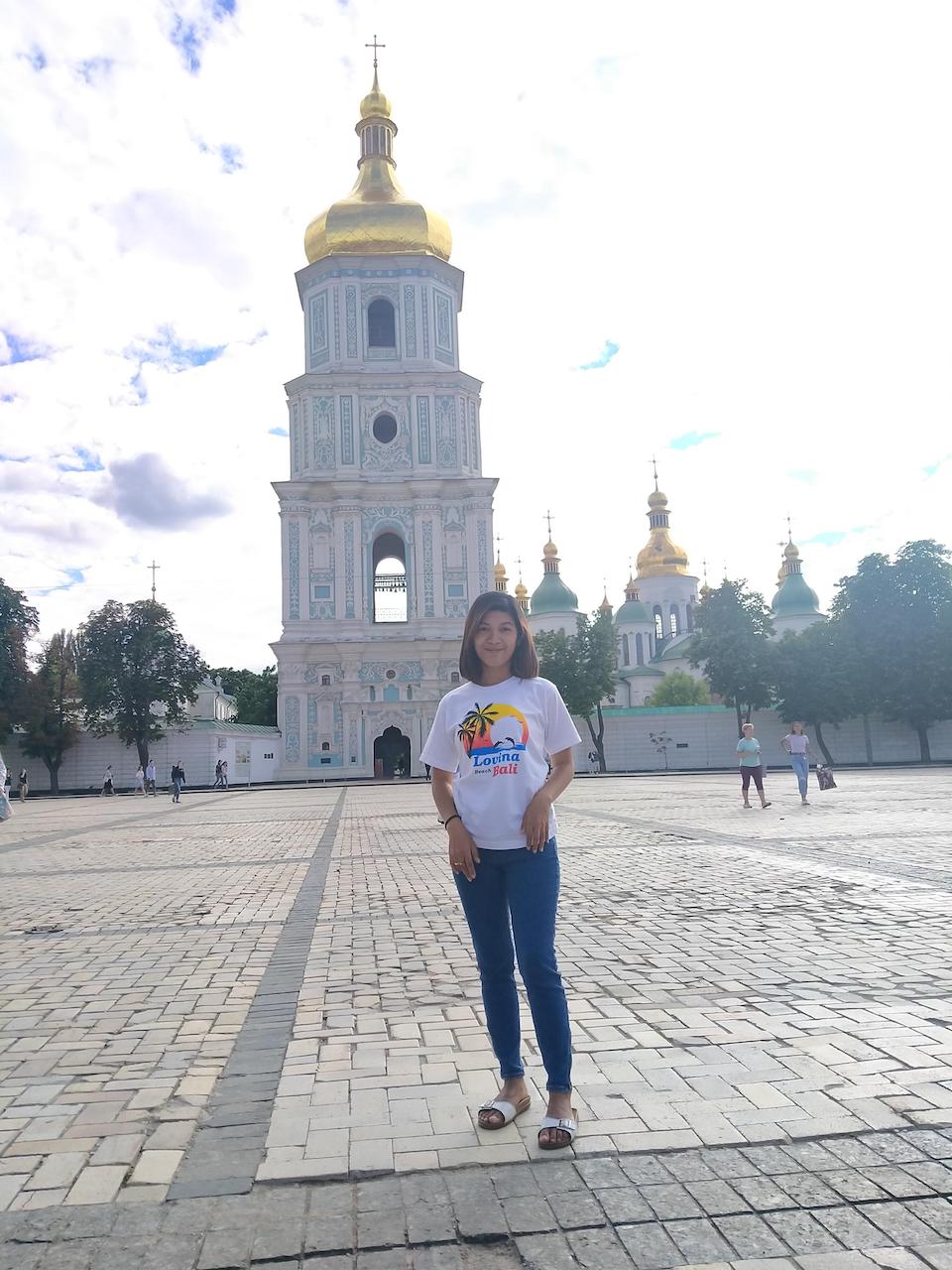

Whirlwind romance
Eliza Dane Cabangon, 28 and a native of Antique, met Andrii, 49, by chance in November 2018 when she was traveling to Bohol by herself. They got on immediately and struck up a friendship that would find themselves exploring Bohol together. After a week, she went back to Antique to go on with her life while he decided to stay in Bohol in the hope of finding a life partner, the main reason of his visit in the Philippines. Despite the distance, Eliza and Andrii kept their communication lines open which eventually led to an unexpected whirlwind romance. Three months later, Eliza and Andrii exchanged I dos in a civil wedding in Davao. “I found my life partner in this soft-spoken, loving and nice man,” explains Eliza.
Eliza’s 82-year-old mother-in-law welcomed her warmly when she arrived in Kyiv in October 2019. In spite of the language barrier, she and Andrii´s mother got along straight away. “She was nice to me. We communicated using Google translate.” Ukraine´s damp weather and the short autumn days however depressed her. “I didn’t have friends so my husband adopted a cat to accompany me when he went to work.”
A Filipina in Ukraine
At the start of her expat life, Eliza also made her time productive by learning Russian. Her husband’s family came from Russia and moved to Ukraine when it was still under the USSR. When the Soviet Union collapsed, they decided to stay, and having been born in Ukraine, Andrii considers himself Ukrainian.
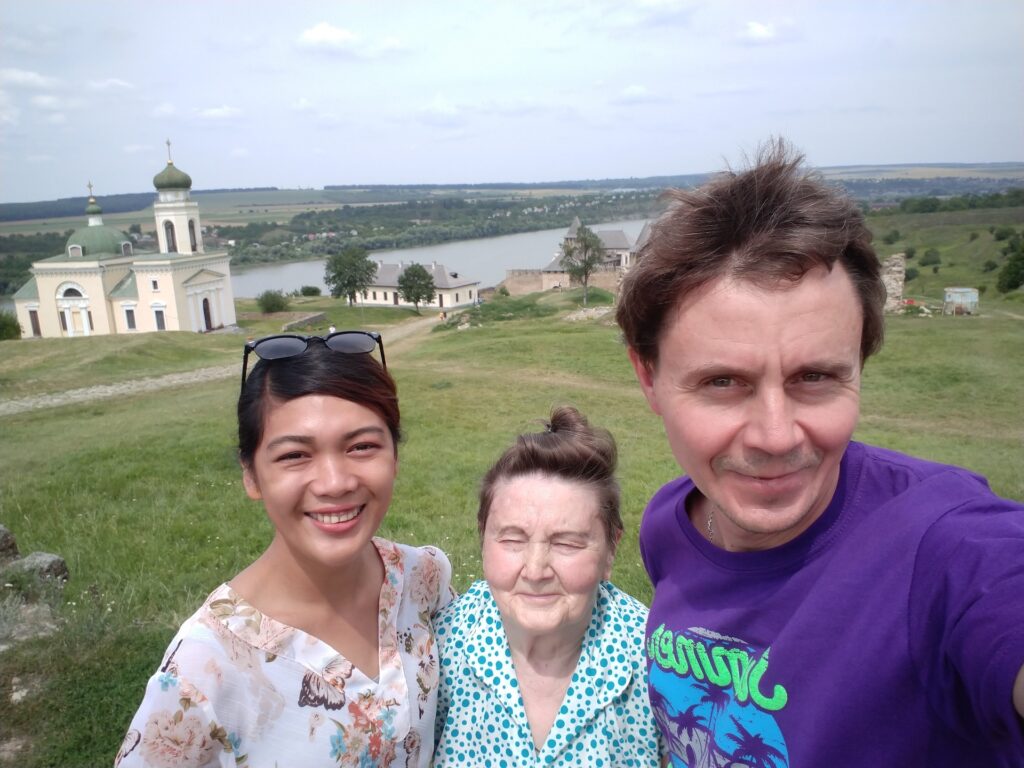
“I didn’t have friends so my husband adopted a cat to accompany me when he went to work.”
Eliza, Filipina in Ukraine
During the pandemic, Eliza found a part-time job as a cleaner and nanny, working 8 hours a day, two times a week. At home, she would help her mother-in-law cook in the kitchen and later walk in the park with her husband.
“But sometimes, my mother-in-law makes tampo when I don’t eat the food that she cooks. Sometimes she gives me money from her pension,” narrates Eliza with a smile. Andrii´s family is very religious and Eliza would go to mass with them. She converted to Orthodox Christianity in July 2021.
“Before we got married, my husband asked me if I was willing to embrace his religion. It took me two years to think about it. After my baptism I became very religious,” shares Eliza.
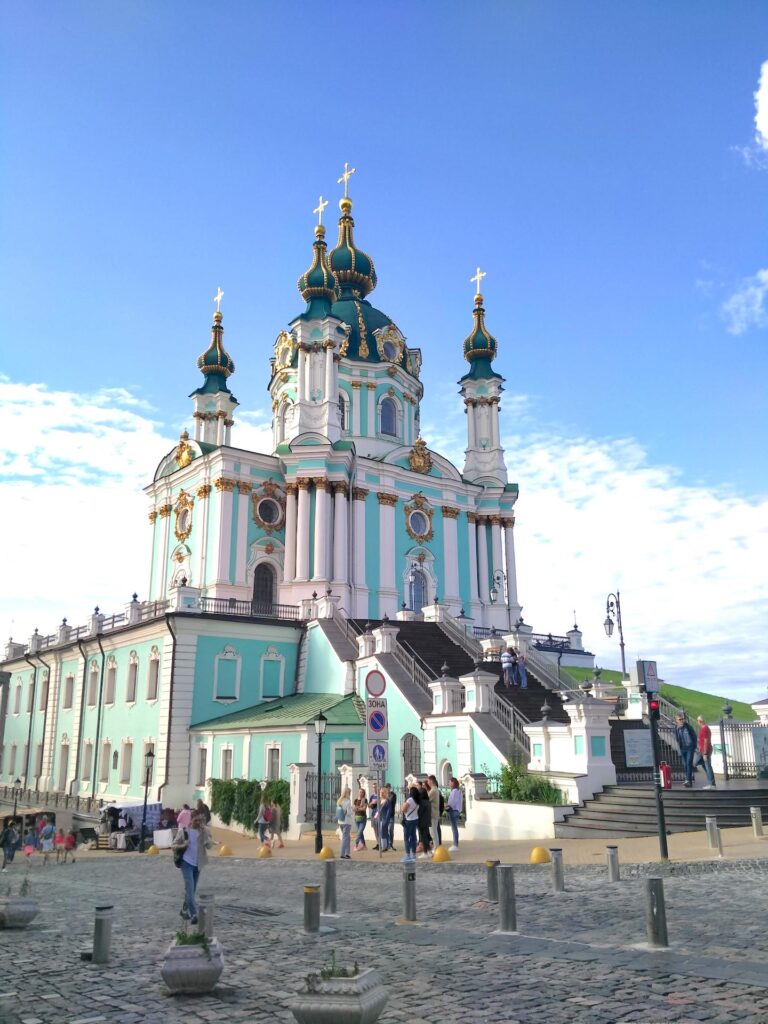
The day of the invasion
The turbulent relationship between Ukraine and Russia dates back many centuries ago, and had displaced millions of civilians and had taken innocent lives. Vladimir Putin’s main contention of the Russian invasion is Ukraine’s plan to join NATO which Russia strongly objects as it will allow the West to edge closer to its borders. But as the war progressed, Putin increasingly began displaying genocidal rhetoric, arguing that “Ukraine is not real and do not have the right to exist.”
Months before the invasion, Putin had announced that he was never going to war with Ukraine, to the relief of the Ukrainian population. “At home, my husband told me that war was never going to happen. The Russians and Ukrainians are like brothers. His family never thought that Russia was going to invade Ukraine,” explains Eliza. According to a survey conducted by the independent pollster Gorshenin Institute, around 62.5% of Ukrainians thought that invasion was not going to happen.
Stuck in Kyiv
After securing some food provisions from an almost empty grocery store, Eliza and Andrii decided to stay at home.They didn’t know what to do. On the way home, Eliza saw long queues at cashpoints where residents rushed to withdraw their money. Civilians armed with their suitcases hurried out of Kiev. A curfew was imposed. About 137 Ukrainian citizens died on that day.
Adrii thought that the war would only last for a week. But it didn’t. The following days would be a nightmare to those who were stuck in the capital. “There were explosions everyday. Our apartment is on the 3rd floor and we immediately ran to the bomb shelter in the building next to ours. Every time there was an explosion, It felt like an earthquake,” describes Eliza.
When the air raid alert sounded off, she and her husband would go to the bomb shelter leaving her mother-in-law who refused to leave their house. No amount of prodding would convince her to stop what she was doing and run to take cover. Instead, she carried on watching cooking shows on YouTube, calm and composed. “Sometimes, I would panic, run to the bathroom and stay there until everything calmed down.There were days when there were six straight explosions,” says Eliza.
It was too late for them to leave Ukraine. Martial law had been declared and men above 18 and under 60 were banned from leaving the country. Her husband couldn’t just sit back and watch his country being battered and his people killed. He enlisted in the army. “Andrii did two years of military service. I got very scared when he told me he was enlisting. He wanted to go to war. I cried every night and prayed very hard that he wouldn’t be sent to the frontline.”
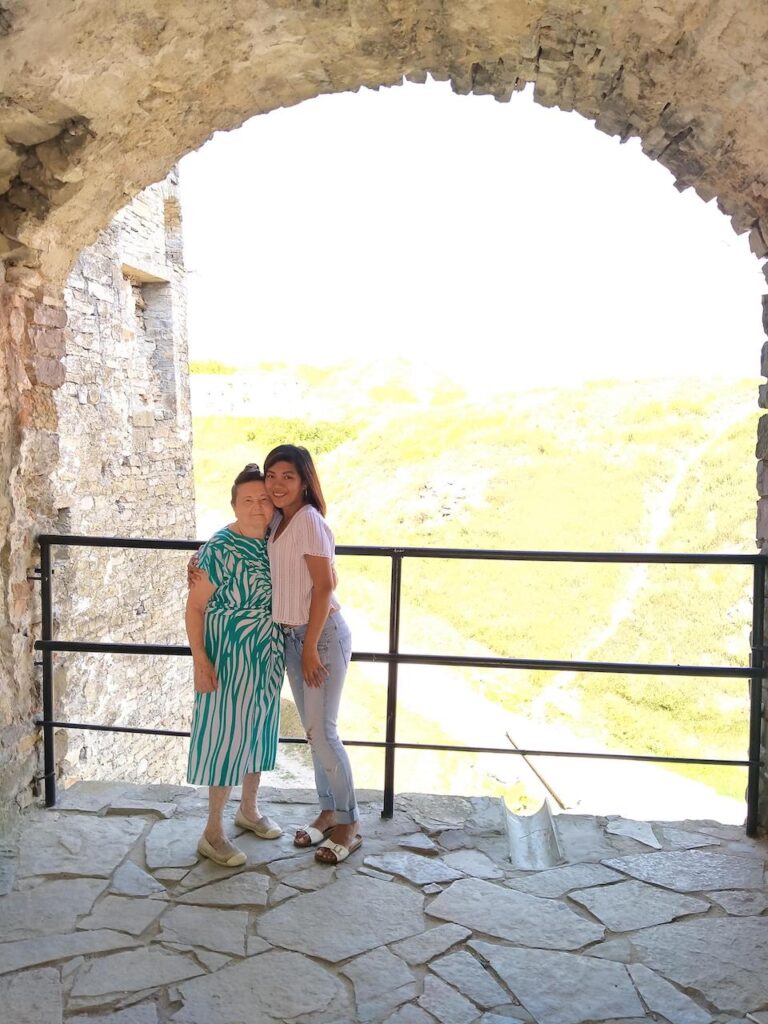
Rollercoaster feelings
Andrii’s post was just a few kilometres from Kyiv. Driving out of the capital, Eliza was shocked seeing the massive destructions the war caused to her adopted country. Destroyed houses, damaged bridges, burned gasoline stations, abandoned war tanks broke her heart.
She moved to a rented flat near her husband’s barracks leaving her mother-in-law in Kyiv, who once again refused to leave the capital. From her new flat, Eliza hears random airstrikes from the distance. To momentarily keep her mind away from the war, she turns to Vlogging on YouTube, listens to the news, watches TikTok and walks inside the house. Andrii comes home every two days and sometimes she walks near the barracks to see him just for a short chat. She is not allowed inside.
The ongoing war has caused Eliza sleep anxiety. “I would stay wake all night and feel weak during the day so my husband accompanied me to a psychiatrist who gave me some mediations which helped me a lot.”
Choosing to stay
Most of her Filipino friends had already fled to other countries in Europe. According to the Philippine Department of Foreign Affairs’ last count, there were only around 100 Filipinos who were still in Ukraine at the end of March, a month after the invasion.
“Every day my friends convince me to go to Hungary. I tell them that we might take the train there once Martial law is lifted. Or once the war is over, when my husband can leave the military, we will go back to the Philippines. If my mother-in-law doesn’t come with us, we will take her to her brother near the Polish border.”
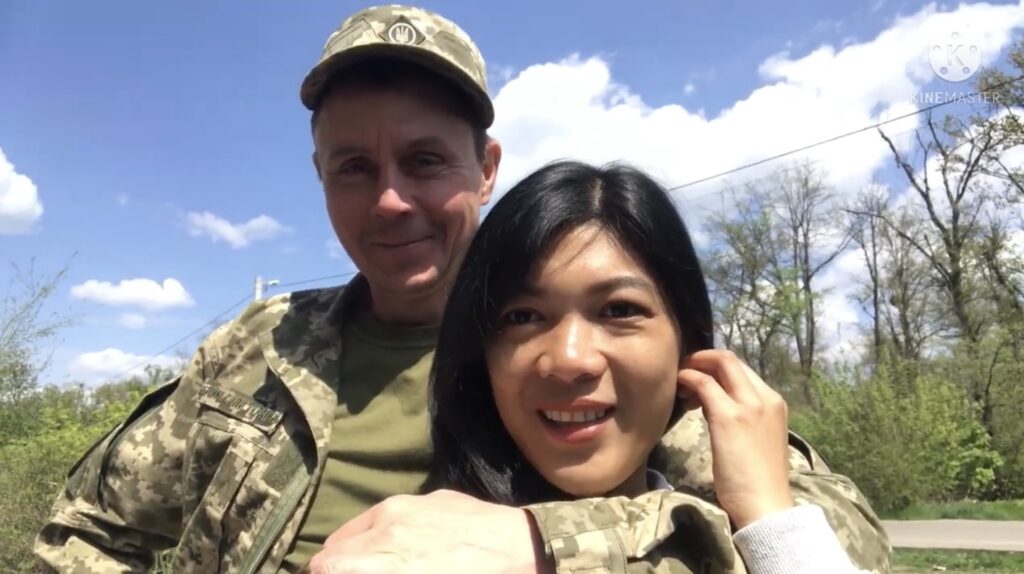
Lessons from the war
After all that she is going through, Eliza doesn’t lose hope. “Ukraine is fighting back. I really hope this war ends soon. The Ukrainians are brave people. We have a courageous president. My husband told me about how his grandparents survived the Holodomor, the Soviet engineered famine that killed millions of Ukrainians in the 1930s. My husband would tell me stories about their hard lives during the Soviet regime.”
But no matter how optimistic Eliza wants to be, her sleep anxiety continues to haunt her. On 20 April, she had an overdose of sleeping pills. Her husband had to call the medics to revive her. “It was dawn. I was so desperate to sleep so I took a lot. It was horrible.”
“Ukraine is fighting back. I really hope this war ends soon. The Ukrainians are brave people. We have a courageous president. My husband told me about how his grandparents survived the Holodomor, the Soviet engineered famine that killed millions of Ukrainians in the 1930s. My husband would tell me stories about their hard lives during the Soviet regime.”
Eliza, Filipina in Ukraine
Eliza misses the happy times before the war, when her life in Ukraine was full of promises. They were just about to start a family and build a beautiful future together with her mother-in-law. Eliza can’t help getting nostalgic. “My husband loves adobo and my mother-in-law loves my pancit. I like everything about Ukraine, its culture, its people.”
“Ukraine´s freedom has not yet perished, nor has her glory… fate shall smile once again…” These are the lines from Ukraine’s national anthem which reflect how the Ukrainian people are holding on four months into the war. And although peace seems to be a far-fetched reality at the moment, Ukrainians are not losing hope.
For Eliza, the war has taught her a very important lesson. “Life is unpredictable. If I can, I want to collect beautiful memories with family and friends because we don’t know what is going to happen tomorrow. It is scary here but I try not to be afraid. I will be with my husband wherever he is.”
Check out Eliza´s blog on YouTube: Pinay in Ukraine
What's Your Reaction?
Nats Sisma Villaluna has been serving the Filipino community in Spain for more than 13 years. His volunteer works include teaching Spanish to Filipinos, and as artistic director of the Coro Kudyapi, a group of musically inclined young Filipinos in Barcelona. His passion to serve the Filipino community now extends to other countries in his role as Publisher and Editor-in-Chief of the new The Filipino Expat Magazine.




